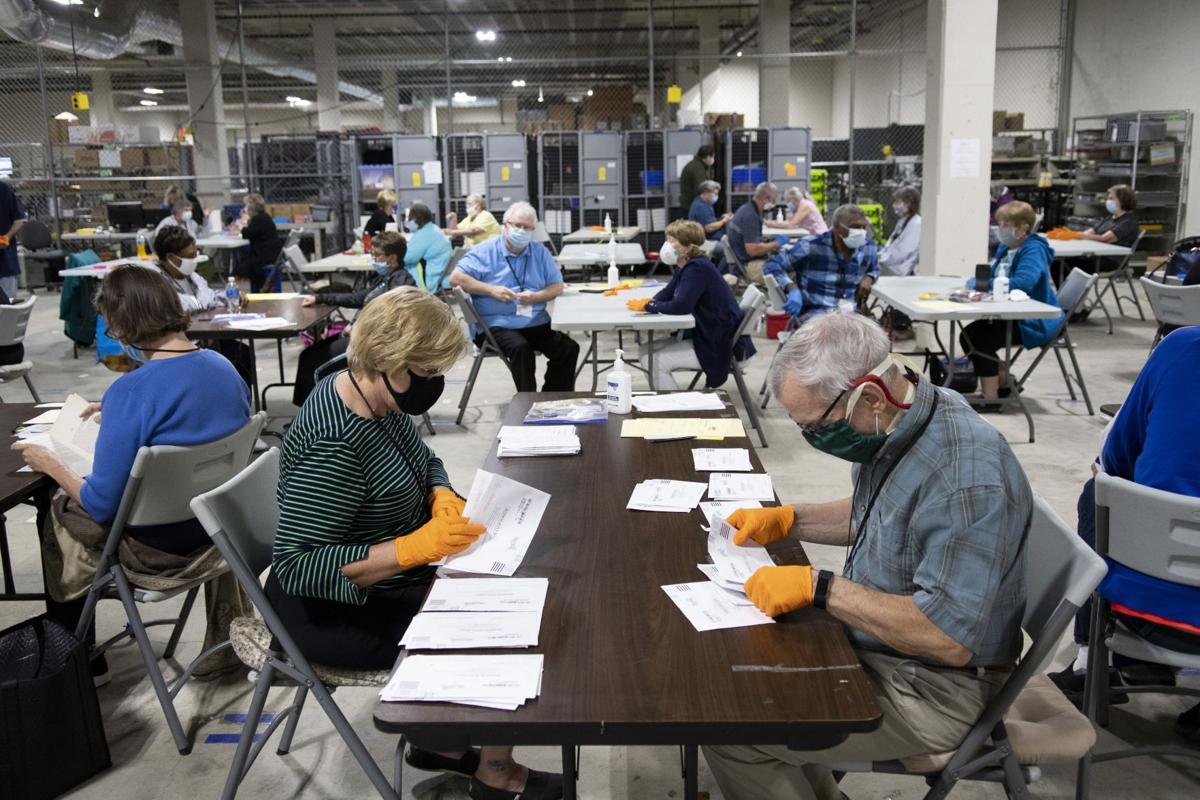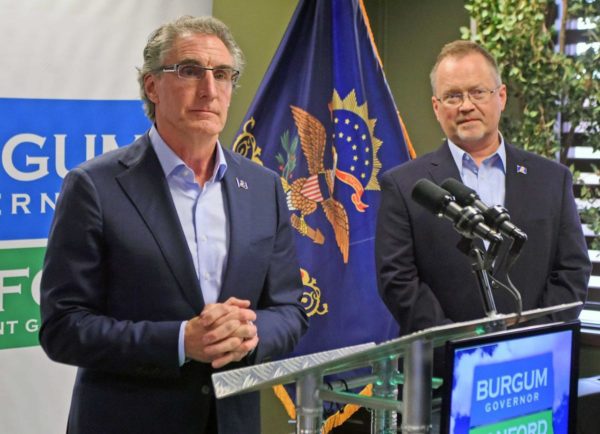
Moms Demand Action members line up during a rally at the State Capitol in Richmond on July 9. Gov. Ralph Northam called a special session of the General Assembly to consider gun legislation in light of the Virginia Beach mass shooting. (Steve Helber/AP)
RICHMOND — The national gun-control group Everytown for Gun Safety is beginning a digital advertising blitz in suburban swing districts in Virginia’s pivotal fall election, targeting Republican lawmakers in Northern Virginia, Richmond and Hampton Roads.
The Everytown for Gun Safety Action Fund has launched $135,000 worth of online ads to kick off a promised $2.5 million in spending this year in Virginia, which the group views as a proving ground for the gun-control issue ahead of next year’s presidential election.
“Everytown has launched our most robust electoral program ever for Virginia, and we have one simple goal: Hold gun lobby lawmakers accountable for their choices,” John Feinblatt, president of Everytown for Gun Safety, said via email. The strategy highlights the route that Democrats feel they can take to win control of the legislature this fall, when all 140 seats are up for election. In an off-off year, with no presidential or gubernatorial races on the ticket to drive turnout, Democrats have to stir up voter interest in close suburban districts that have been trending blue.
If gun control can help accomplish that, it’s a strong indication to national Democrats for how to approach next year’s races. Many outside groups have begun aiming resources toward Virginia, which is the only state in the country with the balance of power at stake in its elections this year.
[National LGBTQ rights group makes big play in Virginia legislative races]
Republicans are defending narrow majorities of 20-19 in the state Senate and 51-48 in the House of Delegates, with one vacancy in each chamber.
“It’s not surprising — I mean, Everytown comes in every single year [since 2011],” said John Findlay, executive director of the Republican Party of Virginia. “If the gun issue was as potent as Everytown thinks it is, we would’ve had Democrat majorities in the House and Senate for the past eight years.”
Guns became a major political issue in the state after a May 31 mass shooting in Virginia Beach, where a gunman killed 12 people at a municipal building before being killed by police. Gov. Ralph Northam (D) summoned the General Assembly to a special session last month to consider gun-control legislation, but Republican leaders adjourned after 90 minutes without debating any proposed bills.
Instead, Republicans referred more than 60 pieces of legislation to the State Crime Commission, which met for two days this week to hear testimony from experts and presentations from bill sponsors. The General Assembly won’t take up the issue again until Nov. 18 — after the elections.
[Virginia Crime Commission digs into data on mass shootings]
Democrats believe the issue is especially powerful in suburban districts that are represented by Republicans but have been tilting blue in recent elections. Everytown said its data backs that up.
The group, which was founded by billionaire former New York mayor Michael Bloomberg, said it conducted a “battleground messaging poll” that showed about 6 in 10 voters in swing districts said Republican opposition to gun control was a convincing reason to vote against the party’s candidates.
The message-testing was conducted in suburban areas at the end of July and beginning of August — before the mass shootings in El Paso and Dayton, Ohio, that inflamed the topic nationwide. Voters were also given statements that questioned Republican records on health care, the environment and taxes, the group said, and gun control was among the most persuasive.
Specifically, the Everytown poll found a positive reaction to the idea of “red flag” laws, which allow authorities to temporarily seize guns from someone deemed a threat to themselves or others. The group said it also believes Virginians oppose the way Republicans handled the special legislative session on gun control.
It has created two digital ads on those themes: one saying GOP lawmakers “chose the NRA over Virginians’ safety,” the other saying they refused “to take action to prevent gun deaths.”
They’ll be directed at voters in three Senate districts: the Loudoun County contest for the seat of retiring Sen. Dick Black (R) between Democrat John Bell and Republican Geary Higgins, as well as one in suburban Richmond and another in Virginia Beach — and 10 House districts.
Those include going after incumbent Del. Tim Hugo (R-Fairfax), the only Republican in the Northern Virginia House delegation, as well as House Speaker Kirk Cox (R-Colonial Heights) and House Appropriations chairman S. Chris Jones (R-Suffolk), both of whom saw their districts become considerably more blue under court-ordered redistricting.
[In Virginia, redrawn districts test Republicans — including House speaker Kirk Cox]
Republicans have accused Democrats — and especially Northam — of using the tragedy of mass shootings for political purposes. Before the Crime Commission convened on Tuesday, Senate Majority Leader Thomas K. Norment (R-James City) said Northam was “pandering” and “irresponsible” to be pushing for immediate legislative action to restrict guns.
But several Republicans have suggested ways to address the issue. House Majority Leader Todd Gilbert (R-Shenandoah) has proposed programs to increase community policing and break the cycle of gang membership, and Hugo has expressed support for a type of red flag law that allows authorities to take a person into custody if they are found to pose a danger.
Cox, also speaking before the Crime Commission convened, said Republicans have been consistent in believing that gun violence is a complex problem that requires study. “We’re committed to that deliberative approach,” he said.
Scott Clement contributed to this report.
Read more:
Local newsletters: Local headlines (8 a.m.) | Afternoon Buzz (4 p.m.)
Like PostLocal on Facebook | Follow @postlocal on Twitter | Latest local news

